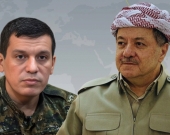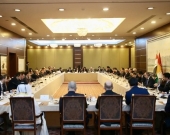Obama and Maliki discuss 'more active' al-Qaeda in Iraq

But following talks at the White House, nearly two years after the last US soldier left Iraq, Mr Obama did not unveil any new offer of military aid.
He stressed the importance of an inclusive and democratic Iraq.
Mr Maliki's visit to Washington DC, his first since 2011, comes as bloodshed hits a five-year high in Iraq.
'Fragile' democracy
In a joint statement released by the White House after Friday's two-hour talks, both the US and Iraq said there was an "urgent" need for additional aid for Iraqi forces.
"The Iraqi delegation stressed its desire to purchase US equipment as a means of strengthening long-term institutional ties with the United States," the statement read.
Mr Maliki has reportedly asked for Apache attack helicopters and other gear from the US. But Mr Obama did not announce any new military aid.
The Iraqi prime minister would not specify the details of his request for US assistance, but said Friday's meeting had been "very positive".
After their private talks, Mr Obama told reporters: "Unfortunately al-Qaeda has still been active and has grown more active recently.
"So we had a lot of discussion about how we can work together to push back against that terrorist organisation that operates not only in Iraq, but also poses a threat to the entire region and to the United States."
Mr Obama also told reporters the US wanted Iraq to pass an election law so Iraqis can discuss their differences politically instead of through violence.
Some US officials say Mr Maliki has ignored calls from Washington to give minorities a greater role in the government.
Many Sunni Muslims accuse Mr Maliki, a Shia Muslim, of marginalising them, spawning a resentment that extremists have sought to exploit.
Mr Obama said a functioning democracy in Iraq would honour all those who had died since the 2003 US invasion.
Mr Maliki vowed to strengthen the "fragile" democracy in his country.
Iraq has seen a spill-over of violence from the conflict in neighbouring Syria, where fighters linked to the Islamic State of Iraq - a Sunni militant umbrella group that includes al-Qaeda - have risen to prominence.
The Iraqi government has also faced widespread criticism over corruption and problems with the provision of basic services.
BBC












